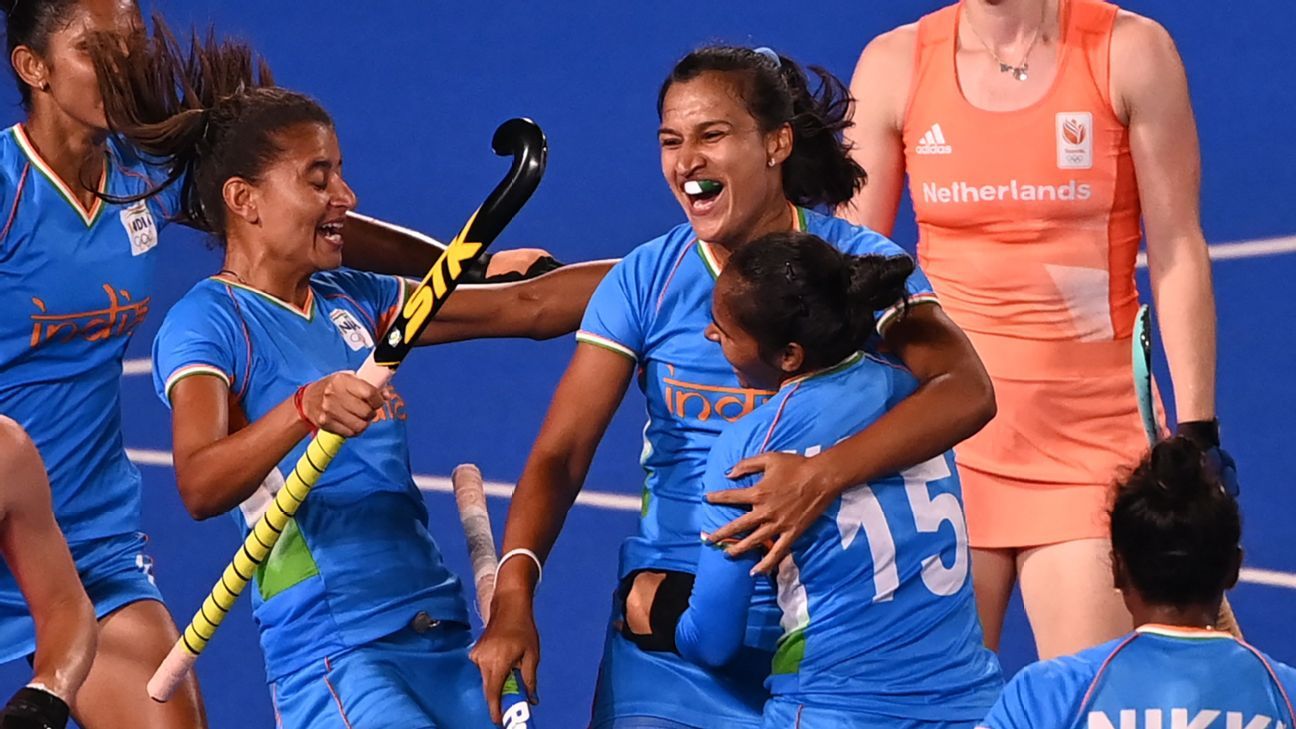
In the Tokyo Olympics, Vandana Katariya was India's star turn. Leading the line for the national hockey team, she became the first Indian woman to score a hattrick in the Olympics, but when the team lost their semifinal against Argentina, none of it seemed to matter. Back home in Haridwar, Uttarakhand, Vandana's family was subject to vile casteist abuse, among which included a lament that India had lost because "there are too many Dalit players in the team".
The police arrested the perpetrators immediately, but even as political leaders came out in loud congratulations for the hockey team's superb run to fourth at Tokyo, the vast majority were silent about the abuse Vandana and her family faced. Her on-field leader, though, was having none of it. Speaking impromptu at a virtual press conference right after their fourth-placed finish, India captain Rani Rampal was unflinching in her statement of support.
"It is such a bad thing. We put our life and soul into it, struggle and sacrifice so much to represent our country and when we see what is happening -- what happened to Vandana's family -- I just want to say to people please stop this religious division and casteism. We have to rise above this.
We come from different religions and come from all parts of India. But here we work for India." A few months later, India cricketer Mohammad Shami was bombarded with communal abuse after a loss to Pakistan in the 2021 T20 World Cup.
Even as the media manager tried to hush past the incident, India captain Virat Kohli put his foot down. "To me attacking someone over their religion is the most, I would say, pathetic thing that a human being can do," he said in the post-match press conference. "Everyone has the right to voice their opinion and what they feel about certain situations, but I personally have never ever even thought of discriminating [against] anyone over their religion.
That is a very sacred and personal thing to every human being and that should be left there." In this era, any era really, this is what leaders are supposed to do: stand up for those who cannot, for the most vulnerable, for the most hurt. It's what Virat Kohli did, it's what Rani Rampal did.
You may argue that it's beyond the ambit of a sportsperson to talk about such heavy social issues, but it's an argument that falls flat because these sportspersons are very much part of the very same society they are not supposed to talk about. We speak about this now because on Thursday, Rani announced that she was retiring from the sport she dominated for a decade and a half. As we bask in the reflected glory of her achievements, let's also take a step back to admire the leadership that made her stand out.
You see, it would have been easy for Rani to not address that 'one-off' incident that happened far away from where they were. Just as it would have been easy for easy for Kohli to keep quiet, shrug and imply that he was following the edict from the management above him. That's what is almost always done when such things happen.
.. and they happen far too often.
Veteran cricketer Wasim Jaffer was routinely targeted on the domestic circuit for his religion. India cricketer Arshdeep Singh has previously been inundated with calls of 'Khalistani'. Badminton star Jwala Gutta endured years of abuse for her appearance (her mother is Chinese) as did six-time boxing world champion (and Olympic medalist) Mary Kom.
Shiva Keshavan used to be abused for the colour of his skin (and lineage - being a South Indian brought up in North India) as was Olympic gold medalist hockey legend Vasudev Bhaskaran. On a live stream with Kohli once, someone wrote on former Indian football captain Sunil Chhetri's channel asking "ye Nepali kaun hain?" (who is this Nepali). India's first Paralympic archer Pooja has spoken about how fellow athletes wouldn't share water with her because of her caste.
Recently, India cricketer Jemimah Rodrigues received rape threats because of a baseless rumour that concerned her father and her religion. Sportswomen are often the hardest with the verbal abuse taking deeply disturbing violent turns (sample the threat to Jemimah) when they are not subject to actual violence..
. and that is why it was so important that Rani spoke up for Vandana. Dalits are too often sidelined and abused in this country, but Dalit women bear the worst brunt of it -- which is why calling out casteism on such a public platform mattered.
Much like how it was critical that Kohli used his substantial public presence to address communalism. That they didn't choose the traditional route -- Keep quiet, ignore it, at worst call out "a few bad apples" and defend a player saying "everyone has a bad day" -- is important. It may seem a simplistic observation, one that is patronizing even, but it's one that must be said: none of the abuse these sportspersons faced stemmed from their on-field performance.
It is all a direct result of deeply entrenched societal biases, which is why calling out that root cause is of paramount importance. In a country that is so virulently against the concept of introspection, it's not an easy thing to do. Kohli had plenty to lose given the current political environment (in the country, and on the cricket board) while it would have been easy enough for the abuse to get channeled to Rani after what she said.
It's a scary thought, but that's the bravery it takes to speak up. And in that bravery lies true leadership..














